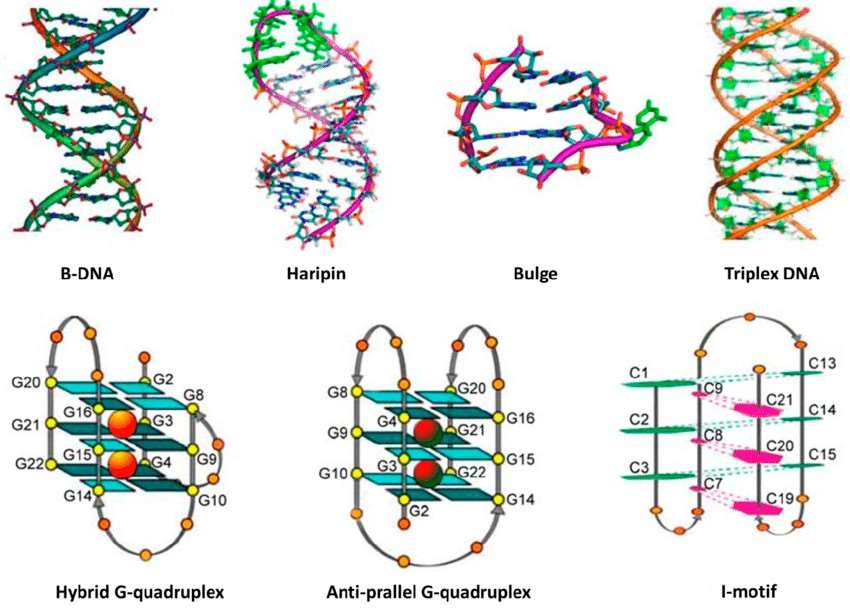Secondary Structures Analysis of DNA & RNA Drugs
Creative Proteomics is a leading biological company specializing in advanced research and analysis services! Our state-of-the-art DNA & RNA secondary structure analysis service is designed to provide you with comprehensive insights into the secondary structure of DNA and RNA.
Introduction of DNA & RNA Drug Secondary Structures
DNA & RNA Secondary Structures refer to the three-dimensional shapes formed by these sequences when hydrogen bonds between complementary base pairs stabilize them. These secondary structures include stem-loop structures, hairpins, bulges, internal loops, and more, each having unique functional implications.
 Fig. 1. Selected secondary structures of DNA Reprinted with permission from ref 263. (Zhang S., et al., 2014)
Fig. 1. Selected secondary structures of DNA Reprinted with permission from ref 263. (Zhang S., et al., 2014)
Our DNA & RNA Secondary Structures Analysis Services
Creative Proteomics is committed to delivering comprehensive and reliable services to our clients. Our expertise in this field enables us to offer a range of detailed services to ensure the accuracy and authenticity of DNA & RNA sequences.
Secondary Structure Prediction
Utilizing computational algorithms, these services predict the secondary structures of given DNA & RNA sequences. This allows researchers to study potential folding patterns and evaluate their functional implications.
Thermodynamic Analysis
These services assess the stability of DNA & RNA secondary structures by calculating thermodynamic parameters like Gibbs free energy, enthalpy, and entropy. Such analyses aid in predicting the likelihood of specific secondary structures forming under varying conditions.
Nuclear Magnetic Resonance (NMR) Spectroscopy
NMR-based services offer high-resolution insights into the secondary structures of DNA & RNA. By detecting the interactions between atomic nuclei, researchers can map out the three-dimensional arrangement of the molecules.
Circular Dichroism (CD) Spectroscopy
CD spectroscopy measures the differences in the absorption of left- and right-circularly polarized light. It provides information about the secondary structure composition of DNA & RNA.
Mass Spectrometry
Mass spectrometry services enable the determination of the molecular weight and structure of DNA & RNA. This information aids in studying modifications, folding, and interactions.
Process of Optical Rotation Testing
The analysis of DNA & RNA secondary structures involves a combination of experimental techniques and computational methods. The process can be summarized in the following steps.
Sequence Selection
Researchers first select the target DNA & RNA sequence that they want to study. This sequence can be a specific gene, a non-coding RNA, or a synthetic oligonucleotide designed for a particular purpose.
Experimental Techniques
Various experimental techniques, such as NMR, CD spectroscopy, or mass spectrometry, are employed to gain structural information about the DNA & RNA. These techniques provide valuable data points that help validate and refine computational predictions.
Computational Prediction
Computational algorithms are then used to predict the secondary structure based on the selected sequence. These algorithms consider factors such as base pairing, hydrogen bonding, and thermodynamic stability to generate potential secondary structure models.
Comparison and Validation
The experimental data and computational predictions are compared and validated against each other. This iterative process refines the accuracy of the final predicted secondary structure.
Functional Analysis
Once the secondary structure is determined, researchers analyze its functional implications in the context of the specific research question or application.
DNA & RNA Secondary Structures Analysis Application Fields
The analysis of DNA & RNA secondary structures holds immense significance in advancing our understanding of various cellular processes. The versatility of DNA & RNA secondary structures analysis allows it to find applications in diverse scientific domains.
- Gene Function and Regulation.
- Drug Design and Development.
- Genetic Disorders and Diagnostics.
- DNA & RNA Biology.
- Evolutionary Studies.
- Biotechnology and Synthetic Biology.
Unlock the potential of your DNA & RNA research with our DNA & RNA secondary structure analysis service at Creative Proteomics. Join countless researchers who have already benefited from our cutting-edge services. We look forward to supporting your scientific endeavors and helping you achieve groundbreaking discoveries. Contact us today to discuss your project or to learn more about our diverse range of biological research services.
Reference
- Zhang S; et al. (2014). Ruthenium Polypyridine Complexes Combined with Oligonucleotides for Bioanalysis: A Review. Molecules. 19(8):11933-11987.
For research use only, not intended for any clinical use.

 Fig. 1. Selected secondary structures of DNA Reprinted with permission from ref 263. (Zhang S., et al., 2014)
Fig. 1. Selected secondary structures of DNA Reprinted with permission from ref 263. (Zhang S., et al., 2014)